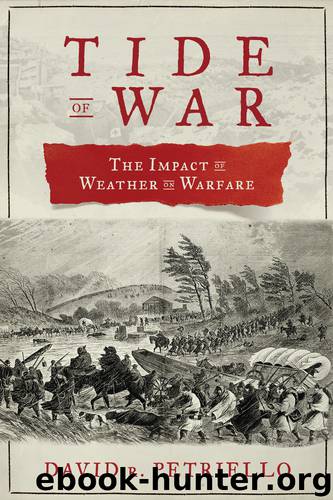Tide of War by David R. Petriello

Author:David R. Petriello
Language: eng
Format: epub
Publisher: Skyhorse Publishing
Published: 2018-01-18T16:00:00+00:00
6
SNOW AND HAIL
Have you entered the storehouses of the snow, or have you seen the storehouses of the hail, Which I have reserved for the time of distress, For the day of war and battle?
—JOB 38: 22–23
SNOW AND HAIL TENDED TO IMPACT war only in certain geographic regions. Likewise, as campaigns historically were only launched from spring until fall, snow had less of a chance to affect war than did rain or other elements. War tended to be avoided in winter for a number of reasons, one of which involved the destruction that could be wrought upon an army by cold and precipitation. Nor was this simply speculation on the part of classical commanders, as a number of historical battles were victim to just such conditions, enough to instill a healthy fear of campaigning in the dead of winter that would continue up until the twentieth century. In fact, even in the modern world, despite information on the impact of disease on the campaign notwithstanding, most blame winter and snow for the downfall of Napoleon in Russia.
Apart from the transportation or health issues associated with snow, hail bore a particularly destructive renown. The Bible emphasized the devastating effect of hail during a battle between Joshua and the Amorites. Following their defeat at the hands of the Israelites, the Amorites fled from Bethoron to Azekah. The Bible recorded that, “As they fled before Israel on the road down from Beth Horon to Azekah, the LORD hurled large hailstones down on them, and more of them died from the hail than were killed by the swords of the Israelites.”126 The rarity of this type of event in the region and the amount of damage it caused were clearly the focus of the writer in an attempt to show divine favor for the Israelites.
Hail as a dangerous deterrent in war continued into the Middle Ages. In 1191, King Richard the Lionheart launched a determined assault on Jerusalem during the Third Crusade. Saladin had largely dispersed his forces, leaving the prized city exposed to siege. Weeks of heavy rainstorms and the onset of cold weather made the campaign untenable. Finally, at Beit Nuba, only a day’s march from their destination, the Crusader army was caught in a hailstorm. The turn in weather, as well as the fear of being cut off from their supply lines should Saladin march to relieve the town, convinced Richard to call off the assault.
A similar event unfolded almost three centuries later as another English king launched a campaign against an enemy capital. Edward III had landed an army at Calais in 1359 and over the course of several months raided his way across northern France. As the French refused to give battle, the English monarch proceeded to ravage the outskirts of Paris in April of 1360. Suddenly, on what was to be remembered as Black Monday, as the English lay encamped outside of Chartres, a massive hailstorm pelted the army. Many men died in the ensuing chaos, with one
Download
This site does not store any files on its server. We only index and link to content provided by other sites. Please contact the content providers to delete copyright contents if any and email us, we'll remove relevant links or contents immediately.
How to Do Nothing by Jenny Odell(3295)
A Forest Journey by John Perlin(3069)
The Plant Messiah by Carlos Magdalena(2927)
Babylon's Ark by Lawrence Anthony(2673)
The ESV Study Bible by Crossway Bibles(2550)
Energy Myths and Realities by Vaclav Smil(2488)
Fatal Storm by Rob Mundle(2214)
Abbey in America by Murray John A(2077)
Witness Tree by Lynda V. Mapes(1925)
Brokeback Mountain by Annie Proulx(1831)
Client Earth by James Thornton(1770)
Shadows on the Gulf by Rowan Jacobsen(1743)
Coming Back to Life by Joanna Macy(1717)
Cosmos by Carl Sagan(1715)
Water Rights and the Environment in the United States by John Burch(1684)
Mycelium Running: How Mushrooms Can Help Save the World by Paul Stamets(1682)
Ten Billion by Stephen Emmott(1652)
The overachievers by Robbins Alexandra(1576)
Ecological Intelligence by Daniel Goleman(1571)
